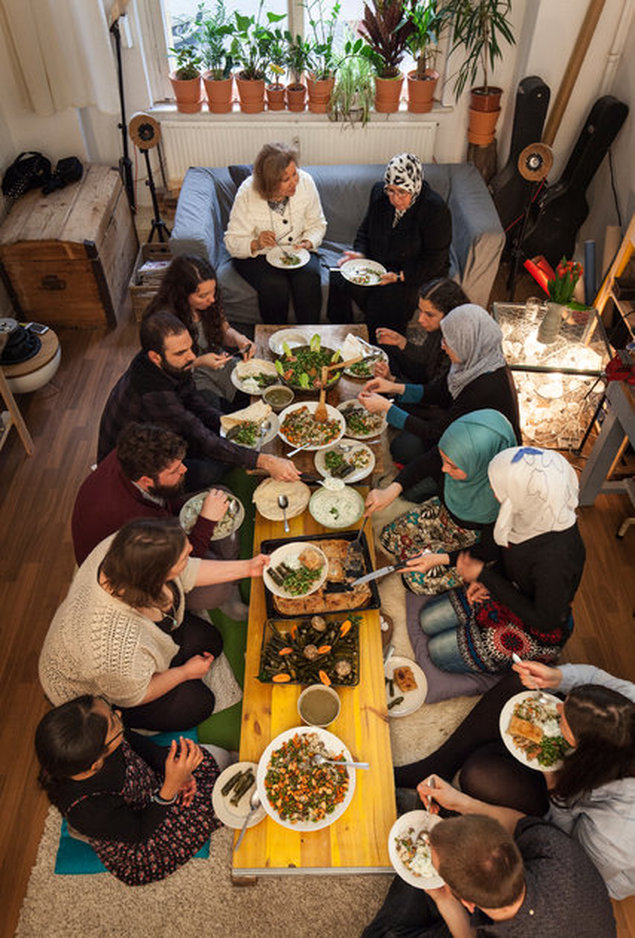Everyone was invited. To the table. To share life. To belong.
Likewise, I believe that as followers of Jesus, we are called to invite others. But not necessarily to a prayer or to a church service as tradition might dictate. But into the radical hospitality and welcome of Jesus. Into a new community and a new way of life. For we’ve been talking about reinterpreting the gospel in our day and in our time so that it truly is good news to our neighbors. And not a bummer. [And by the way, it’s so sad when it’s a bummer. This is not the gospel that Jesus preached, for bummer ≠ good news.]
And so my working theory is that we have invited people to the wrong thing. To a gospel too small. To a prayer, a set of beliefs, a code of morality, a Sunday school club that is in stark contrast to Jesus’ invitation. For his invitation was to be a part of a new revolution of love, a new reality of forgiveness and grace and freedom that defied empire and lifted the oppressed, and it was for everyone and everything. For Jesus did not invite others to say a prayer or to go to the temple.
Jesus invited the people of his day into a new community, a new culture, and a new way of life.
This is why we call ourselves The Practicing Church. For we believe that we are called to a way of life that must be lived out in a community of faith. We cannot do it alone. For I believe that it is the gospel, this way of love lived out in the community, that will ultimately be good news to our neighbors.
But hospitality is everything. We see it in the early church. Rodney Stark describes it this way in The Rise of Christianity, ". . . Christianity served as a revitalization movement that arose in response to the misery, chaos, fear, and brutality of life in the urban Greco-Roman world. . . . Christianity revitalized life in Greco-Roman cities by providing new norms and new kinds of social relationships able to cope with many urgent problems. To cities filled with the homeless and impoverished, Christianity offered charity as well as hope. To cities filled with newcomers and strangers, Christianity offered an immediate basis for attachment. To cities filled with orphans and widows, Christianity provided a new and expanded sense of family. To cities torn by violent ethnic strife, Christianity offered a new basis for social solidarity. And to cities faced with epidemics, fire, and earthquakes, Christianity offered effective nursing services. . . . For what they brought was not simply an urban movement, but a new culture capable of making life in Greco-Roman cities more tolerable."
As I read this, I am amazed by this new community and their radical hospitality, generous love and solidarity with those who were suffering. We need this now more than ever. As we grow increasingly divided, as communities are displaced and families are pulled apart, as violence dominates the headlines, and life becomes more and more fragmented. Oh what if this was true of the church today?
I think it’s important to note that we do not have the gospel without this radical call of Jesus to those who are not church folks, not like us. Jesus modeled a scandalous and highly controversial faith that welcomed and included those in society who were not welcomed and included. He befriended those on the margins, those who were invisible, those who were oppressed. And he was highly criticized by the religious people of the day for hanging out with the wrong people. But we must understand this.
This. Is. The Gospel. It’s essence being radical welcome and inclusion. We see this as Jesus welcomed women, Samaritans, crooks, adulterers, and lepers, many who were considered to be no less than dogs in society. No one is outside of God’s mercy and grace. And in fact, in the economy of the kingdom, the least is the greatest. And when we see the gospel transform communities, it breaks down all the divides. The kingdom is for everyone. Slave and free. Rich and poor. Educated and uneducated. Jew & Gentile. Christian & Muslim. Indigenous and refugee. Black, brown, yellow, red and white. Straight and gay. Conservative and liberal. Everyone is welcome. [See Extravagant Welcome]
And so this summer, I hope you will do one thing. One amazing, defiant, subversive thing.
Practice hospitality. Invite people. Not to say a prayer. But to belong. Don’t invite them to church. Instead, invite them into your lives. Invite them into your homes. Invite them to friendship. To a walk. To dinner. On a bike ride or on a hike. Invite them into community. All I am asking is that this summer as the Seattle freeze thaws, and neighbors are out and folks might be inclined to come over for a barbecue or beer, practice hospitality. Weekly. Daily. Invite others to do what you are already doing. Be present to a conversation with a co-worker. Get uncomfortable and invite someone you don’t know very well out for coffee. Because the kingdom of God is like an extravagant feast. And everyone’s invited.
by Jessica Ketola



 RSS Feed
RSS Feed
